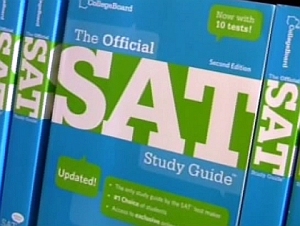(ThyBlackMan.com) Further revelations about the SAT cheating scandal that emerged in September and has now ensnared at least 40 former high school students from Long Island, New York, in addition to the original 5 suspects charged with accepting payments between $500 to $3600 to take SAT and ACT exams for other people, have come to light in recent weeks. On November 23, the Wall Street Journal reported that eleven students were arrested a day earlier in connection with an ever-widening investigation by the Nassau County District Attorney’s Office that now includes a probe of a private school in Queens, New York. Nassau County District Attorney Kathleen Rice revealed that a total of 40 students are now suspected of cheating on the SAT and ACT and have been charged with misdemeanors, and more arrests could follow. Rice also speculates that the investigation could reveal parental involvement in enabling the accused teens to pay for the faked test scores. In September, 19-year-old Emory University sophomore Samuel Eshaghoff, an alumnus of Great Neck North High School, was arrested for accepting money from six current Great Neck North students as payment for taking the SAT exam for them. More recently, four of Eshagoff’s accomplices were arrested for the same crime: Michael Pomerantz, a graduate of Great Neck North High School; Joshua Chefec, also a graduate of Great Neck North; George Trane, a graduate of Great Neck South High School; and Adam Justin, a graduate of North Shore Hebrew Academy.
The Scholastic Aptitude Test (SAT) is a college entrance examination taken by thousands of high school juniors and seniors annually in the U.S. and is favored  by college faculty and admissions officers as a measure of a high school student’s academic preparedness for study at a U.S. university. The SAT is administered by Educational Testing Service, Inc. (ETS), a private corporation founded in 1947 and headquartered in Princeton, New Jersey.
by college faculty and admissions officers as a measure of a high school student’s academic preparedness for study at a U.S. university. The SAT is administered by Educational Testing Service, Inc. (ETS), a private corporation founded in 1947 and headquartered in Princeton, New Jersey.
As a Black schoolteacher and Long Islander, I am outraged by two aspects of this fiasco. Firstly, if you have been following the recent headlines about white-collar fraud, insider trading, and Occupy Wall Street, as I have, then by now you have probably been forced to pose the following question – isn’t the Long Island cheating scandal the inevitable result of a college admissions process imbued with the same moral indifference that permeates the wider society? In a country in which racial discrimination is alive and well, where qualified minority applicants to elite colleges, graduate schools, and professional schools are routinely discriminated against ( the admitted class of 2015 at Harvard College is only 12% African-American, according to the school’s website ), where universities can still get away with employing few, if any, faculty of color ( the Harvard Faculty of Arts & Sciences employed just 1 Black junior faculty member in the Humanities and only 2 Black junior faculty members in the Engineering department in the 2011-12 academic year, according to the annual report of Harvard’s Office of Faculty Development & Diversity), and where applicants of financial means still receive preferential treatment, can the academy, and sadly, the crème-de-la-crème of the academy, reasonably expect young people to adhere to some non-existent example of ethical conduct in academic affairs? One, that is not the way to get ahead, our young people have been led to infer. And two, elitism and racism are, to varying degrees, both highly immoral.
I can personally attest to the fact that public displays of self-righteous indignation by faculty and students alike at the growing diversity of Ivy League campuses, usually, but not always, manifested as profanity-laden diatribes against affirmative action, welfare, or some other government-sponsored social program, have not abated in the past 15 to 20 years. Years ago, on my first night as a freshman at the University of Pennsylvania, I was subjected to a verbal assault by my roommate, an Italian-American from New Jersey, who upon laying eyes on me for the first time, screamed in a tone of disbelief, “in my f***ing room!”. He then ran out of our suite and down the hallway, repeatedly shouting “not in my f***ing room!” to an audience of shocked and amused onlookers. I found his utterance to be, to say the least, a very peculiar greeting for a new college roommate. While I can only speculate about his thinking, I was left with the distinct impression that his utterances and actions that night had been provoked by my identity as an African-American. That impression was reinforced on subsequent nights when he recommended to several of our mutual hallmates that they not socialize with me, recommended to our mutual suitemates that they purchase locks for their bedroom doors (insinuating I was a thief), and was later involved in an altercation with a Hispanic-American who confided to university officials that he believed my roommate to be a racist.
I was an upper-middle class Honors student from Long Island, a four year varsity sportsman and recipient of many academic awards. I had an impressive SAT score. I was accepted into an Ivy League university by the sweat of my brow, not as the result of affirmative action or any sort of charity. I never imagined that the issue of race could be so problematic at an American college, yet this one horrifying experience was my initiation into the moral universe represented by the Ivy League, and my introduction to the type of individual who could gain admittance. Based on my own experience, I am not at all shocked by the SAT cheating allegations on Long Island – after all, Eshaghoff, his accomplices, and his customers – all likely believed they were acting on the principles embodied by the Ivy League and in accordance with a code of conduct, albeit crooked and perverse, that is rewarded in American society at large.
Sadly, as an educator, I have seen countless young people led astray by the corrupted values of a steady moral decline in academia and society. Incidentally, in the age of deregulated American capitalism – aren’t these Long Island teenagers merely misguided entrepreneurs, rather than condemnable con artists? Excuse my sarcasm – but haven’t we all witnessed similar displays of unbridled greed and ambition on Wall Street, and its consequences? In October, barely a month after Eshaghoff was arrested, former Galleon Group hedge fund manager and multimillionaire Pennsylvania (Wharton) MBA graduate Raj Rajaratnam was convicted of 14 counts of conspiracy and securities fraud after earning an ill-gotten $63 million by trading on inside information. Rajaratnam received an 11-year prison sentence, the longest on record for insider trading, and is widely considered to be one of the biggest Wall Street crooks since Ivan Boesky looted the stock market in the 1980s. As late as last week, former Goldman Sachs CEO and governor of New Jersey Jon Corzine was summoned to appear before the House and Senate Committees on Agriculture and the House Financial Services Subcommittee on Investigations over the collapse of commodities broker MF Global, which Corzine ran as CEO up until Nov. 4, and which is embroiled in a lawsuit by former employees and a fraud scandal involving an estimated $6.3 billion in losses over misplaced bets on European debt. We would all be hypocrites if we expected young Samuel Eshaghoff to be more ethical and responsible than some of our wealthiest and most distinguished citizens.
The second aspect of this scandal that irks me is the very fact that the mainstream media appears intent on ignoring – that there are now, as of this writing, potentially dozens of students at elite colleges such as Harvard, Yale, Pennsylvania, Princeton, Brown, Stanford, Chicago and similar institutions, who were granted admission undeservedly as a result of fake SAT scores. These privileged, White, Long Island suburbanites may well have displaced qualified applicants of color from less affluent backgrounds, and in much greater need of the opportunities a top-flight education can afford. As a former Brooklyn, New York schoolteacher, I have witnessed the poverty associated with urban public education in the United States – my classroom lacked basic necessities taken for granted in Long Island schools, supplies like textbooks, encyclopedias, maps, and writing materials – and I have often wondered why geography has been such a strong indicator of dashed hopes for children in city schools. The chance to attend college, any college, was out of reach for many of my own students.
In short, the Long Island SAT cheaters didn’t just defraud ETS and their fellow test-takers across the country – they cheated inner-city kids attempting to overcome nearly insurmountable odds; kids for whom a high standardized test score might have opened a door had not their university seat already been stolen by unscrupulous Long Island families. And yet, in a culture that rewards, and more often condones, unethical behavior of all sorts – should anyone be surprised? The hypocrisy of the Long Island SAT cheating scandal may lie in the unwillingness of some to see Eshaghoff and his customers for what they are – the products of the modern state of American academia and society.
Staff Writer; David Christopher Steele, M.A.
Official website; http://www.facebook.com/steele.dave88

















I went to school with most of the kids that were arrested, none of them applied to top tier schools…
I am not surprised at all to hear this. In many realms, there are cheaters. There are people who get the test in advance for jobs, etc. Take a look at this: http://en.wikipedia.org/wiki/Ghostwriting. You will see how many cheaters there are out there!!!